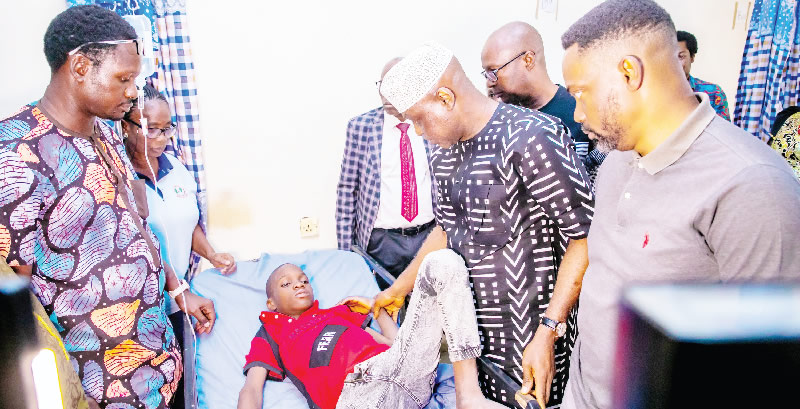
Kidnapping epidemic: Fundraising for ransom persists, Ekiti pupils’ families pay N15m
The practice of kidnapping victims and their families using social media, friends, and family to raise money to secure their release has gained momentum despite federal government warnings against crowd-funding for ransoms.
Early on Sunday morning, the students and faculty of the Apostolic Faith Group of Schools, Emure Ekiti, who had been kidnapped the previous week, were released.
Speaking, a few of the victims' parents and other family members claimed that the kidnappers released their captives after taking N15 million and other goods, such as fried rice.
The school's proprietor, Gabriel Adesanya, acknowledged to one of our correspondents that a ransom had been paid, but he did not disclose the precise sum.
A few weeks prior, the Minister of Defence, Abubakar Badaru, had issued a warning to the relatives of kidnapped victims cautioning against crowd-funding and paying ransom to kidnappers in response to the wave of kidnappings in Abuja, Kaduna, Lagos, and numerous other states.
The minister acknowledged that there was widespread knowledge of the kidnapping among the Federal Capital Territory area councils when he spoke following a meeting between President Bola Tinubu and the service chiefs at the Presidential Villa.
"We all know that there is an existing law against the payment of ransom," Badaru said in response to the question of crowdsourcing to pay ransom. Thus, it is quite depressing to hear people pleading for money to buy ransom over the radio and the internet.
In a similar vein, the Nigeria Police Force cautioned Nigerians against ransom crowdfunding, particularly on social media.
On January 2, Nigerians were cautioned against the practice by Delta State Police Public Relations Officer Bright Edafe, who described it as criminal in a post on his official X handle.
Crowdfunding is illegal when used to pay a ransom. It is risky and ought not to be supported. Let's stop enabling kidnapping to become a profitable and flourishing industry in Nigeria. You may not realise how deep this tweet is. It has nothing to do with dragging me or the police. We seriously need to discourage this,” Edafe posted.
Muyiwa Adejobi, the Force Public Relations Officer, added that the practice compromised security and fueled the nation's kidnapping frenzy.
Ransom payment is illegal in Nigeria, according to Adejobi, who made this point in a February 1 interview with Channels TV.
"We won't benefit at all from crowdsourcing on social media, which reached a point where it happened. It's illegal. That's not permitted. It is deemed unacceptable. The Federal Government denounced it as well. "Crowdfunding is prohibited," he declared.
Families defend their payments.
The families of those kidnapped, however, defended the act by claiming that they had paid ransoms to protect the lives of their loved ones.
A kidnapped victim in Zamfara State identified himself as Mohammed Shehu, confirming that he raised money through crowd-funding to secure his release. Mohammed Shehu told The PUNCH on Sunday that he was initially demanded to pay a ransom of N20 million by bandits, but that amount was later lowered to N10 million.
Shehu, a native of Magami town in Zamfara State's Gusau Local Government Area, claimed he tried to raise N5.3 million by selling his house and other belongings, but his family and friends were unable to find the remaining N4.7 million to release him.
He claimed that since the bandits had given a seven-day ultimatum, his family and other individuals needed to contribute in order to ensure that the amount was paid.
He said, “When I was kidnapped on the Gusau-Sokoto road and taken to the forest, the bandits leader reached out to my family and told them to pay N20m as ransom. However, after the negotiation, the amount was reduced to N10m.
“I told the family to sell off my house and other things so that they could raise the amount and pay because I was being punished by the kidnappers. After the sale of my house and other valuables, the sum of N5.3m was realised and taken to the bandits, but they insisted that the balance of N4.7m must be paid or they would kill me.
“My family members had to go begging to get the money and that was how I was released by the bandits.”
Many Katsina victims and their families explained how ransoms were raised to get their freedom from kidnappers.
They disclosed that families, friends, coworkers, and high-ranking government officials helped raise the ransom amounts that their captors demanded to be paid in order to free them.
Coworkers generate money
According to a former senior official of the National Broadcast Commission, his family, the local traditional ruler, and colleagues all contributed to the ransom that was paid to his captors in order to secure his release and the release of his daughter.
The retired officer, who requested anonymity, stated, "My daughter and I were abducted by bandits a few months ago." The ransom that was paid to secure our release came from friends, coworkers, my family, and the traditional leader of my community.
Victims of kidnapping in Delta State told stories of how their friends, family, and church community came up with money to pay the ransom.
One of our correspondents was informed by a friend of a victim who was kidnapped in the Bonsaac neighbourhood of Asaba, the capital of Delta State, who did not want his name to be published, that he was able to organise other friends to donate money to secure the victim's release.
"I was actually at the man's (victim's) shop when I got a call about my friend being abducted," he stated. I quickly left the store to keep his wife from learning what was going on. I then relocated to a barbershop to carry on the kidnapping negotiations.
"After a while, they gave the man's wife a call, and that's how she found out and began searching for me. I later informed her that I had left their shop due to the news."
We began negotiating with them at N1 million instead of N5 million. To raise the ransom that I took to Nkwere-ezunnka in Anambra State before he was released, all of us—friends and relatives—contributed.
Wilson, a victim of the 2022 kidnapping of the Abuja-Kaduna train, told how his family members used social media to raise the N20 million that his captors demanded.
He clarified that his mother had raised money to ensure his release by selling the family generator.
Wilson recalled, "My mom told me she had to call her siblings, friends, and church members for help after we were released. A few of my cousins alerted friends to the situation on social media, specifically Facebook, and to their contact lists on WhatsApp, requesting that they contribute to the fund-raising. Even the generator had to be sold by my mum.
"I'm not sure whether or not I agree with the law. You cannot, however, be certain that the police in Nigeria will take you seriously even if you report it. I mean, while they are investigating, your loved one could be dying, if not dead.
Even after paying a hefty ransom, it can be challenging to explain to someone who has likely lost multiple loved ones why crowdsourcing is illegal. He emphasised that anybody would stop at nothing to protect their family.
The five Al-Kadriyar girls' abduction sparked a national outcry against kidnappings in the nation, and their uncle, Abbas Al-Kadriyar, claimed that "everyone contributed to securing the release of my nieces while they were in captivity."
Noting the threats made against his family during their captivity, he continued, "If the government wanted to curb crowd-funding for ransom, it should ensure the security of lives and property."
The family took care of themselves. We couldn't survive on our own, so the public pitched in. Everyone in Nigeria was involved, including individuals, friends, family, Christians, and Muslims as well as religious organisations. Everyone made a contribution, he disclosed.
"If I am losing a family, if any of us are losing family members, and you are being asked to bring ransom, are you going to bring it or not?" Al-Kadriyar continued. Nobody will go and pay a ransom if citizens' lives and property are properly protected.
"Our family members were in danger of being killed, and we were on the brink of losing them. They urged us to bring cash, issued an order to us, and there was a threat that if we did not bring it, they would drop (kill) one each day.
"Yes, the law is in place; let it do its thing." But are our lives safe before the law comes to our rescue? The protection of people and property is the main goal of the government. He reasoned that if it is well secured, then no one will even need to go after kidnapping or demanding a ransom.
Adebisi Jegede, a parent of one of the victims who was kidnapped in Ekiti State, confirmed that the kidnappers received payment in ransom.
On January 29, after school hours on the Emuro-Eporo road, five students and four staff members of the Apostolic Faith Group of Schools, Emure Ekiti, were abducted.
In an interview on Sunday, Jegede stated, "The money was ransomed to the kidnappers."the money raised was around the N15m they demanded. I was not the one that counted the money but it was around that amount.”
Additionally, a man whose wife and son were among the abducted individuals claimed that the kidnappers received a N15 million ransom in addition to other items in a large forest before the abductees were freed.
Nin





